Unit 6 Nature in words Using language 课件(共26张)外研版(2019)选择性必修 第三册
文档属性
| 名称 | Unit 6 Nature in words Using language 课件(共26张)外研版(2019)选择性必修 第三册 |
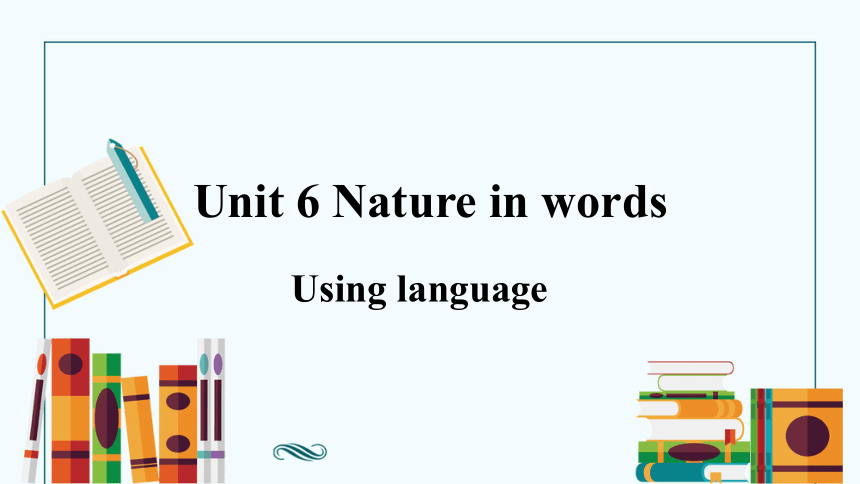
|
|
| 格式 | pptx | ||
| 文件大小 | 1.3MB | ||
| 资源类型 | 教案 | ||
| 版本资源 | 外研版(2019) | ||
| 科目 | 英语 | ||
| 更新时间 | 2025-04-28 18:41:04 | ||
图片预览


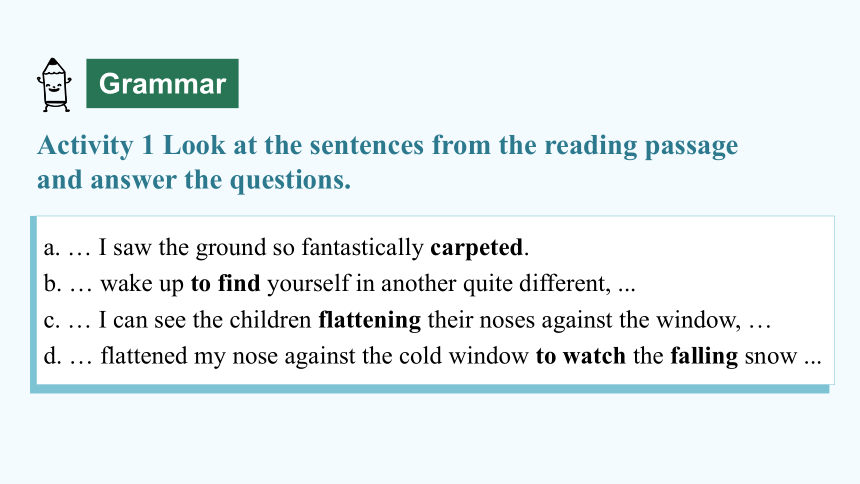
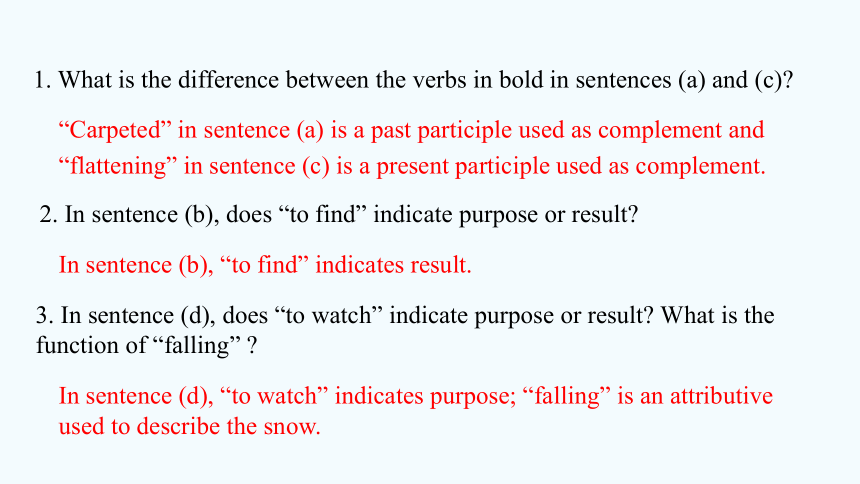
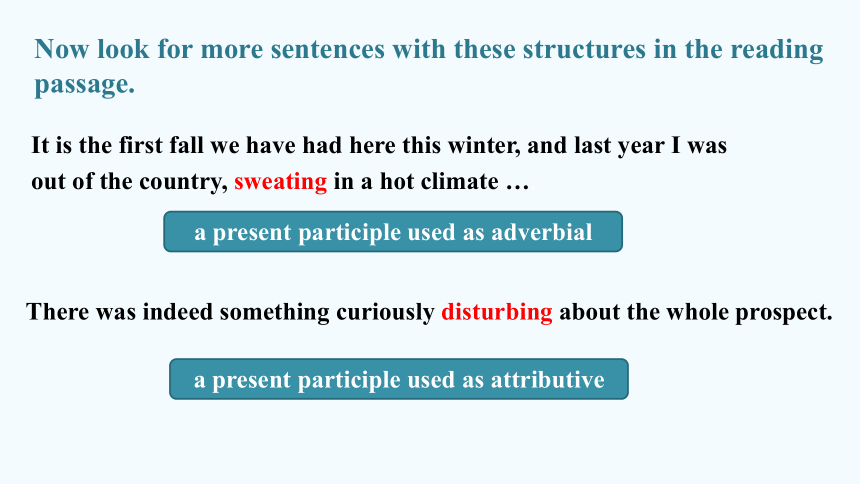
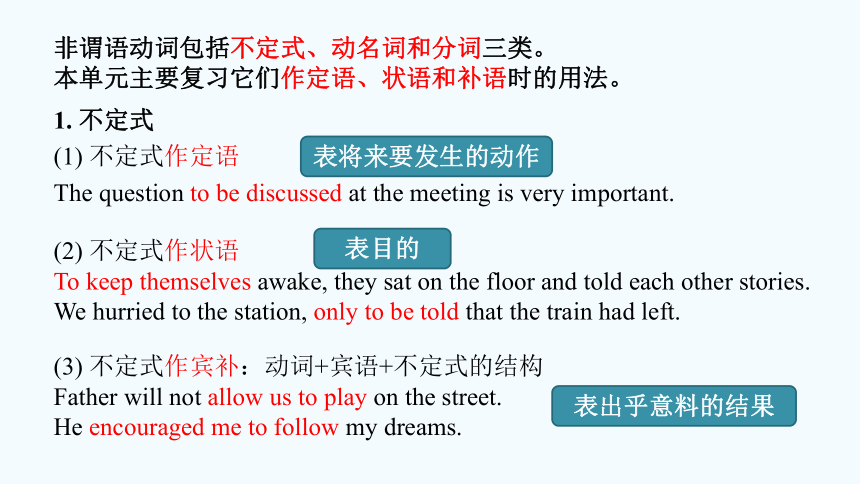
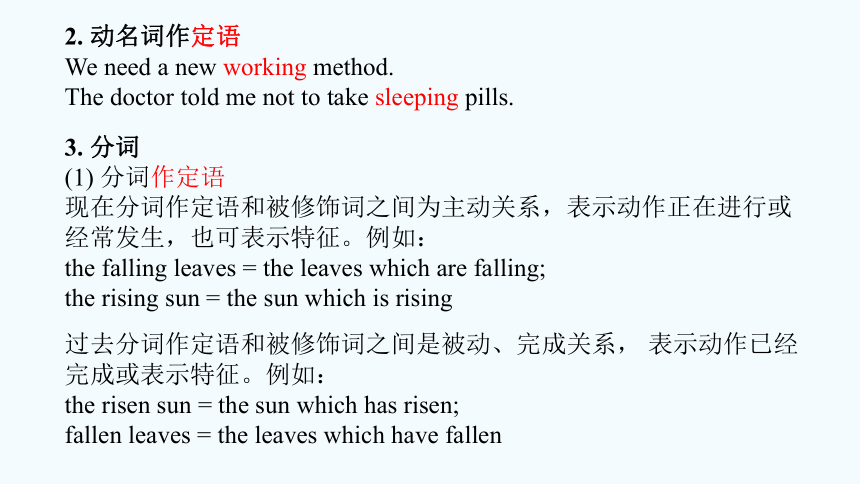
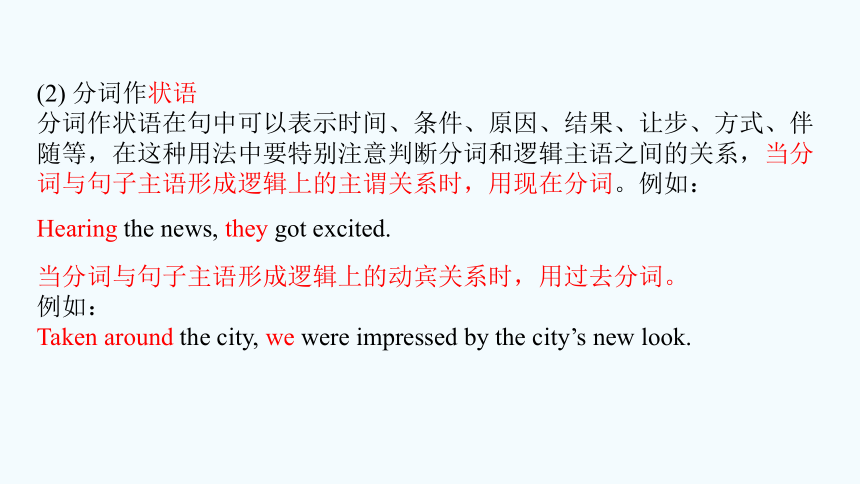
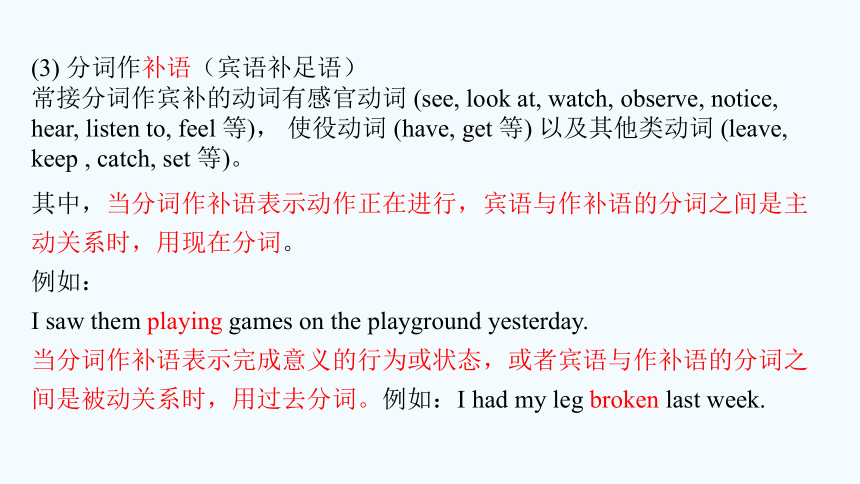
文档简介
(共26张PPT)
Using language
Unit 6 Nature in words
Learning objectives
1. To review the usage of non-finite forms as attributive, adverbial and complement;
2. To use non-finite forms as attributive, adverbial and complement.
3. To learn words describing nature and clarify them correctly;
4. To listen for why many words describing nature disappeared, and use expressions of giving examples and giving explanations correctly.
Activity 1 Look at the sentences from the reading passage and answer the questions.
a. … I saw the ground so fantastically carpeted.
b. … wake up to find yourself in another quite different, ...
c. … I can see the children flattening their noses against the window, …
d. … flattened my nose against the cold window to watch the falling snow ...
Grammar
1. What is the difference between the verbs in bold in sentences (a) and (c)
“Carpeted” in sentence (a) is a past participle used as complement and “flattening” in sentence (c) is a present participle used as complement.
2. In sentence (b), does “to find” indicate purpose or result
3. In sentence (d), does “to watch” indicate purpose or result What is the function of “falling”
In sentence (b), “to find” indicates result.
In sentence (d), “to watch” indicates purpose; “falling” is an attributive used to describe the snow.
Now look for more sentences with these structures in the reading passage.
It is the first fall we have had here this winter, and last year I was out of the country, sweating in a hot climate …,
a present participle used as adverbial
There was indeed something curiously disturbing about the whole prospect.
a present participle used as attributive
非谓语动词包括不定式、动名词和分词三类。
本单元主要复习它们作定语、状语和补语时的用法。
1. 不定式
(1) 不定式作定语
The question to be discussed at the meeting is very important.
表将来要发生的动作
(2) 不定式作状语
To keep themselves awake, they sat on the floor and told each other stories.
We hurried to the station, only to be told that the train had left.
表目的
表出乎意料的结果
(3) 不定式作宾补:动词+宾语+不定式的结构
Father will not allow us to play on the street.
He encouraged me to follow my dreams.
2. 动名词作定语
We need a new working method.
The doctor told me not to take sleeping pills.
3. 分词
(1) 分词作定语
现在分词作定语和被修饰词之间为主动关系,表示动作正在进行或经常发生,也可表示特征。例如:
the falling leaves = the leaves which are falling;
the rising sun = the sun which is rising
过去分词作定语和被修饰词之间是被动、完成关系, 表示动作已经完成或表示特征。例如:
the risen sun = the sun which has risen;
fallen leaves = the leaves which have fallen
(2) 分词作状语
分词作状语在句中可以表示时间、条件、原因、结果、让步、方式、伴随等,在这种用法中要特别注意判断分词和逻辑主语之间的关系,当分词与句子主语形成逻辑上的主谓关系时,用现在分词。例如:
Hearing the news, they got excited.
当分词与句子主语形成逻辑上的动宾关系时,用过去分词。
例如:
Taken around the city, we were impressed by the city’s new look.
其中,当分词作补语表示动作正在进行,宾语与作补语的分词之间是主动关系时,用现在分词。
例如:
I saw them playing games on the playground yesterday.
当分词作补语表示完成意义的行为或状态,或者宾语与作补语的分词之间是被动关系时,用过去分词。例如:I had my leg broken last week.
(3) 分词作补语(宾语补足语)
常接分词作宾补的动词有感官动词 (see, look at, watch, observe, notice, hear, listen to, feel 等), 使役动词 (have, get 等) 以及其他类动词 (leave, keep , catch, set 等)。
Activity 2 Complete the passage with the correct form of the verbs in brackets.
The Lake Poets were a small group of poets 1._______ (live) in the Lake District of England in the late 18th and early 19th centuries. The Lake District, 2._______ (know) for its beauty, is in the north-west of England. The first of the poets 3._______________ (come) there was Robert Southey, one of the most 4. __________ (respect) poets of his time. He was followed by William Wordsworth, perhaps Britain’s most 5.___________ (celebrate) 19th century poet, and then Samuel Coleridge, who had written the 6.__________ (pioneer) work Lyrical Ballads with Wordsworth. Soon, 7._______ (draw) both by its natural beauty and a desire to be near these famous poets, other poets came 8._______ (live) in the Lake District. All of these poets were seen as part of the Romantic Movement.
to come / coming
living
known
celebrated
pioneering
respected
drawn
to live
Activity 3 Look at the picture and complete the travel journal entry with the words in the box. Use the structures you have learnt in this unit where appropriate.
find blow go see
fall relax enjoy run
Today, whilst walking along a peaceful river running through a university campus , I was amazed to find …
Activity 4 Work in pairs. Talk about a travel experience of your own that brought you closer to nature, using the structures you have learnt in this unit where appropriate.
Activity 5 Read the paragraph and answer the questions. Pay attention to the words in bold.
There is no month in the whole year in which nature wears a more beautiful appearance than in the month of August. Spring has many beauties, and May is a fresh and blooming month, but the charms of this time of year are enhanced by their contrast with the winter season.August has no such advantage. It comes when we remember nothing but clear skies, green fields, and sweet-smelling flowers — when the memory of snow, and ice, and bleak winds, has faded from our minds as completely as they have disappeared from the earth — and yet what a pleasant time it is!
bloom 开花
Describing nature
bleak 阴冷的
Orchards and fields sing with the sound of work; trees bend beneath the thick clusters of rich fruit which bow their branches to the ground; and the wheat, piled in graceful sheaves, or waving in every gentle wind that sweeps above it, tinges the landscape with a golden colour.
A soft, pleasant light appears to hang over the whole earth; the influence of the season seems to extend itself even to a passing wagon, whose slow motion across the well-reaped field is seen by the eye, but makes no loud noises upon the ear.
(Adaptation from The Pickwick Papers by Charles Dickens)
tinge 给……染色,着色
sheaves: sheaf 的复数;
sheaf: 小麦捆
cluster 簇
1. What does this paragraph mainly describe
This paragraph mainly describes the beautiful appearance in the month of August.
The author describes the skies, fields, flowers, orchards, trees, wheat and the quality of the light.
2. What aspects does the author describe
Activity 6 Put the words in Activity 5 into the boxes. Find out what they are used to describe.
Sound
loud
Colour
clear, green, rich, golden
Action
blooming, bend, bow, piled, waving, sweeps, tinges, makes
Shape
thick clusters, graceful sheaves
Smell
fresh, sweet-smelling
Sensation
fresh, bleak, gentle, soft, pleasant
Now think of more words in each category and add them to the boxes. Then describe nature during your favourite season with the words you have learnt.
For example: fragrance of flowers, full of vitality, still leaves, cloudless, freezing, chilly …
Open a dictionary, and you’ll be surprised to find that there are many more words about nature than you would think. There are various ways to describe the things we see in the natural world, no matter whether it’s a flower, an animal or the rain. For example, there are many ways to describe the different sounds of birds, such as chatter, chirp, cluck, hoot and tweet. These words can help us to write vivid descriptions of nature.
Did You Know
Activity 7 Listen to the conversation and answer the questions.
1. What book was the man reading
The man was reading a book called Landmarks.
Because he read a book, whose author said many words describing nature were now missing from the new version of the junior dictionary.
2. Why was the man annoyed
She says we are losing old words all the time. And as times change, new words become as normal to young people as the old ones are to her grandfather.
3. What was the girl’s opinion
Activity 8 Listen to the conversation again and correct the mistakes in the man’s blog.
Recently I was reading a book called Landmarks by Robert Macfarlane. What the author wrote made me feel confused. He said that many words describing nature were being added to the new version of the junior dictionary. These are words like “pasture” and “bluebell”. A “pasture” is a dense forest for cows and horses to eat. “Bluebells” are fruit shaped like bells. The reason why they are doing this is that they think these words are irrelevant to children, so instead they’ve replaced them with terms like “film”. Perhaps the dictionary does have a point, because most children don’t get out into nature that much nowadays. They spend all their time watching TV instead.
annoyed
now missing from
field of grass
blog
on computers
But it’s a pity. In my opinion, these words form part of our literature. They add colour to our lives. and shouldn’t be lost. My granddaughter has the same opinion as me. She says we are losing old words all the time. And as times change, old words become as normal to young people as the new ones are to me.
history
a different opinion from
new words become as normal to young people as the old ones are to me
Read the blog again and act out the conversation.
… such as …
The main reason …
…, for instance.
Two reasons, I think.
Consider …
Giving examples
Giving explanations
Activity 9 Complete the boxes with the expressions from the conversation.
… such as …
…, for instance.
The main reason …
Two reasons, I think.
Consider …
Activity 10 Work in pairs. Talk about your opinions of the issue discussed in Activity 8 using the expressions in this section.
Now think about your performance.
Have you actively participated in the discussion What can you do to improve your performance
1. Review the non-finite forms as attributive, adverbial and complement and do the relevant exercises.
2. Consult the dictionary or search the Internet for more words to describe nature.
Homework
Using language
Unit 6 Nature in words
Learning objectives
1. To review the usage of non-finite forms as attributive, adverbial and complement;
2. To use non-finite forms as attributive, adverbial and complement.
3. To learn words describing nature and clarify them correctly;
4. To listen for why many words describing nature disappeared, and use expressions of giving examples and giving explanations correctly.
Activity 1 Look at the sentences from the reading passage and answer the questions.
a. … I saw the ground so fantastically carpeted.
b. … wake up to find yourself in another quite different, ...
c. … I can see the children flattening their noses against the window, …
d. … flattened my nose against the cold window to watch the falling snow ...
Grammar
1. What is the difference between the verbs in bold in sentences (a) and (c)
“Carpeted” in sentence (a) is a past participle used as complement and “flattening” in sentence (c) is a present participle used as complement.
2. In sentence (b), does “to find” indicate purpose or result
3. In sentence (d), does “to watch” indicate purpose or result What is the function of “falling”
In sentence (b), “to find” indicates result.
In sentence (d), “to watch” indicates purpose; “falling” is an attributive used to describe the snow.
Now look for more sentences with these structures in the reading passage.
It is the first fall we have had here this winter, and last year I was out of the country, sweating in a hot climate …,
a present participle used as adverbial
There was indeed something curiously disturbing about the whole prospect.
a present participle used as attributive
非谓语动词包括不定式、动名词和分词三类。
本单元主要复习它们作定语、状语和补语时的用法。
1. 不定式
(1) 不定式作定语
The question to be discussed at the meeting is very important.
表将来要发生的动作
(2) 不定式作状语
To keep themselves awake, they sat on the floor and told each other stories.
We hurried to the station, only to be told that the train had left.
表目的
表出乎意料的结果
(3) 不定式作宾补:动词+宾语+不定式的结构
Father will not allow us to play on the street.
He encouraged me to follow my dreams.
2. 动名词作定语
We need a new working method.
The doctor told me not to take sleeping pills.
3. 分词
(1) 分词作定语
现在分词作定语和被修饰词之间为主动关系,表示动作正在进行或经常发生,也可表示特征。例如:
the falling leaves = the leaves which are falling;
the rising sun = the sun which is rising
过去分词作定语和被修饰词之间是被动、完成关系, 表示动作已经完成或表示特征。例如:
the risen sun = the sun which has risen;
fallen leaves = the leaves which have fallen
(2) 分词作状语
分词作状语在句中可以表示时间、条件、原因、结果、让步、方式、伴随等,在这种用法中要特别注意判断分词和逻辑主语之间的关系,当分词与句子主语形成逻辑上的主谓关系时,用现在分词。例如:
Hearing the news, they got excited.
当分词与句子主语形成逻辑上的动宾关系时,用过去分词。
例如:
Taken around the city, we were impressed by the city’s new look.
其中,当分词作补语表示动作正在进行,宾语与作补语的分词之间是主动关系时,用现在分词。
例如:
I saw them playing games on the playground yesterday.
当分词作补语表示完成意义的行为或状态,或者宾语与作补语的分词之间是被动关系时,用过去分词。例如:I had my leg broken last week.
(3) 分词作补语(宾语补足语)
常接分词作宾补的动词有感官动词 (see, look at, watch, observe, notice, hear, listen to, feel 等), 使役动词 (have, get 等) 以及其他类动词 (leave, keep , catch, set 等)。
Activity 2 Complete the passage with the correct form of the verbs in brackets.
The Lake Poets were a small group of poets 1._______ (live) in the Lake District of England in the late 18th and early 19th centuries. The Lake District, 2._______ (know) for its beauty, is in the north-west of England. The first of the poets 3._______________ (come) there was Robert Southey, one of the most 4. __________ (respect) poets of his time. He was followed by William Wordsworth, perhaps Britain’s most 5.___________ (celebrate) 19th century poet, and then Samuel Coleridge, who had written the 6.__________ (pioneer) work Lyrical Ballads with Wordsworth. Soon, 7._______ (draw) both by its natural beauty and a desire to be near these famous poets, other poets came 8._______ (live) in the Lake District. All of these poets were seen as part of the Romantic Movement.
to come / coming
living
known
celebrated
pioneering
respected
drawn
to live
Activity 3 Look at the picture and complete the travel journal entry with the words in the box. Use the structures you have learnt in this unit where appropriate.
find blow go see
fall relax enjoy run
Today, whilst walking along a peaceful river running through a university campus , I was amazed to find …
Activity 4 Work in pairs. Talk about a travel experience of your own that brought you closer to nature, using the structures you have learnt in this unit where appropriate.
Activity 5 Read the paragraph and answer the questions. Pay attention to the words in bold.
There is no month in the whole year in which nature wears a more beautiful appearance than in the month of August. Spring has many beauties, and May is a fresh and blooming month, but the charms of this time of year are enhanced by their contrast with the winter season.August has no such advantage. It comes when we remember nothing but clear skies, green fields, and sweet-smelling flowers — when the memory of snow, and ice, and bleak winds, has faded from our minds as completely as they have disappeared from the earth — and yet what a pleasant time it is!
bloom 开花
Describing nature
bleak 阴冷的
Orchards and fields sing with the sound of work; trees bend beneath the thick clusters of rich fruit which bow their branches to the ground; and the wheat, piled in graceful sheaves, or waving in every gentle wind that sweeps above it, tinges the landscape with a golden colour.
A soft, pleasant light appears to hang over the whole earth; the influence of the season seems to extend itself even to a passing wagon, whose slow motion across the well-reaped field is seen by the eye, but makes no loud noises upon the ear.
(Adaptation from The Pickwick Papers by Charles Dickens)
tinge 给……染色,着色
sheaves: sheaf 的复数;
sheaf: 小麦捆
cluster 簇
1. What does this paragraph mainly describe
This paragraph mainly describes the beautiful appearance in the month of August.
The author describes the skies, fields, flowers, orchards, trees, wheat and the quality of the light.
2. What aspects does the author describe
Activity 6 Put the words in Activity 5 into the boxes. Find out what they are used to describe.
Sound
loud
Colour
clear, green, rich, golden
Action
blooming, bend, bow, piled, waving, sweeps, tinges, makes
Shape
thick clusters, graceful sheaves
Smell
fresh, sweet-smelling
Sensation
fresh, bleak, gentle, soft, pleasant
Now think of more words in each category and add them to the boxes. Then describe nature during your favourite season with the words you have learnt.
For example: fragrance of flowers, full of vitality, still leaves, cloudless, freezing, chilly …
Open a dictionary, and you’ll be surprised to find that there are many more words about nature than you would think. There are various ways to describe the things we see in the natural world, no matter whether it’s a flower, an animal or the rain. For example, there are many ways to describe the different sounds of birds, such as chatter, chirp, cluck, hoot and tweet. These words can help us to write vivid descriptions of nature.
Did You Know
Activity 7 Listen to the conversation and answer the questions.
1. What book was the man reading
The man was reading a book called Landmarks.
Because he read a book, whose author said many words describing nature were now missing from the new version of the junior dictionary.
2. Why was the man annoyed
She says we are losing old words all the time. And as times change, new words become as normal to young people as the old ones are to her grandfather.
3. What was the girl’s opinion
Activity 8 Listen to the conversation again and correct the mistakes in the man’s blog.
Recently I was reading a book called Landmarks by Robert Macfarlane. What the author wrote made me feel confused. He said that many words describing nature were being added to the new version of the junior dictionary. These are words like “pasture” and “bluebell”. A “pasture” is a dense forest for cows and horses to eat. “Bluebells” are fruit shaped like bells. The reason why they are doing this is that they think these words are irrelevant to children, so instead they’ve replaced them with terms like “film”. Perhaps the dictionary does have a point, because most children don’t get out into nature that much nowadays. They spend all their time watching TV instead.
annoyed
now missing from
field of grass
blog
on computers
But it’s a pity. In my opinion, these words form part of our literature. They add colour to our lives. and shouldn’t be lost. My granddaughter has the same opinion as me. She says we are losing old words all the time. And as times change, old words become as normal to young people as the new ones are to me.
history
a different opinion from
new words become as normal to young people as the old ones are to me
Read the blog again and act out the conversation.
… such as …
The main reason …
…, for instance.
Two reasons, I think.
Consider …
Giving examples
Giving explanations
Activity 9 Complete the boxes with the expressions from the conversation.
… such as …
…, for instance.
The main reason …
Two reasons, I think.
Consider …
Activity 10 Work in pairs. Talk about your opinions of the issue discussed in Activity 8 using the expressions in this section.
Now think about your performance.
Have you actively participated in the discussion What can you do to improve your performance
1. Review the non-finite forms as attributive, adverbial and complement and do the relevant exercises.
2. Consult the dictionary or search the Internet for more words to describe nature.
Homework
